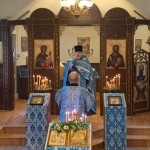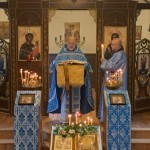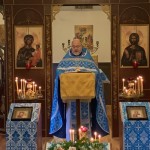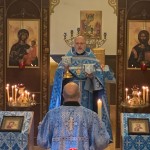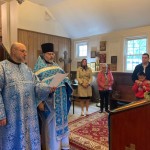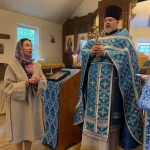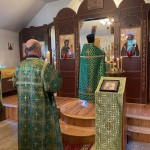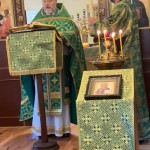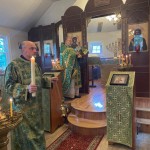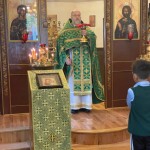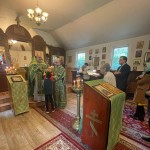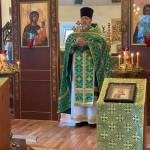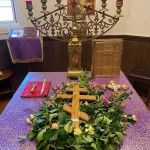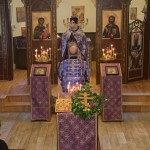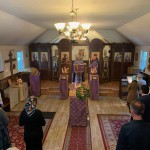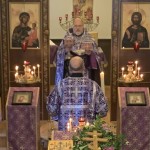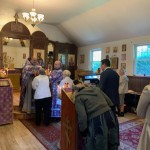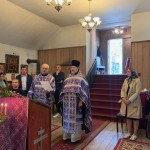On October 15, on the 19th Sunday after Pentecost, our Parish also celebrated Protection of the Most Holy Mother of God. Rector of St. George Church, Archpriest Igor Tarasov served the Divine Liturgy. After the Scripture readings he preached the following homily:
“Dear brothers and sisters in Christ! Today we celebrate the 19th Sunday after Pentecost and we also observe feast of the Most Holy Mother of God – Her Protection. In today’s first Epistle lesson we are told strange words that St. Paul says the Lord Himself told him: “My grace is sufficient for you, for My strength is made perfect in weakness” (2 Cor. 12, 9). This is a paradox of our Christian faith: strength is made perfect in weakness”.
“We have to say that Christianity is full of paradoxes, of certain contradictions. Philosophers and theologians call them antinomies. Our faith is full of them. We believe in God Who is ineffable, inconceivable and incomprehensible, yet we believe that we may know Him. We say that God does not belong to the world, yet He is present everywhere in the world. We believe that God is Spirit, yet He became man. We believe that God is strange to our nature, yet He acquired our own nature. We believe that God is inapproachable by men, yet we may become the partakers of His nature. In the same way St. Paul tells us that the Lord says that our strength is made perfect in our weakness”.
“When we are weak, then we are strong. This is so because our weakness makes us lean on God’s strength. There is a story of a sheep that limped and never went away from the shepherd. Someone asked about this sheep – why it limped and why it never left the shepherd’s side. The shepherd explained that that sheep was partially deaf and could not hear the shepherd’s voice. As a result, it was often in danger. Many times it had to be rescued. Finally the shepherd had to injure the sheep’s leg. Since then the sheep limped, but it stayed closer to the shepherd and it was safe. The sheep was weak, but it was strong along with the shepherd”.
“In today’s Epistle reading St. Paul tells that he was also afflicted by some “limp”. It did not come from God, but from the evil one. Paul says that he was given “a thorn in flesh, a messenger of Satan to buffet me” (2 Cor. 12, 7). Many interpreters of the Scripture guessed what kind of “thorn on flesh” St. Paul had. It could be a chronic illness, or troublesome Christians who criticized him, or hard-hearted Israelites who persecuted him, or even some sinful desire which burned St. Paul, tempted his flesh. We don’t know for sure. But what we do know is that God allowed that thorn to remain in order to keep Paul weak, “limping” at the Shepherd’s side where he would find constant strength for his weakness. And when St. Paul discovered that the true purpose of that thorn was to keep him close to the Source of power, he rejoiced. He said, “Therefore, most gladly I will rather boast in my infirmities, that the power of Christ may rest upon me” (2 Cor. 12, 9)”.
“All of us, at least once in our lives, were driven into a corner from which there seemed to be no way out. If this happened, you may be sure that God allowed it, so He may come with His almighty power to deliver you. But first He wants you to discover that you are powerless and that you have to depend on Him. “When I am weak then I am strong.” If we are weak, let us admit it and accept it. Let us not pretend that we are able to do a lot of things. Accept the weakness, but not just the weakness. Accept that such feeling of weakness is needed to lead us to Him Who is the real source of strength”.
“Today, as we celebrate the Protection of the Most Holy Theotokos, we may recall the history of this feast. The imperial city of Constantinople was under a siege. The enemies surrounded the city and wanted to take it. The inhabitants of Constantinople were weak, desperate. There seemed to be no way out of that danger to be conquered and killed by the enemies. But they prayed. They prayed to God and to His Blessed Mother. And one of them, a humble holy man saw the apparition. The Most Holy Mother of God appeared in the sky and covered the city with Her veil, with Her protection. And a miracle took place: the enemies retreated and the city was spared. In the same way, we may come to the intercession of the Holy Mother of God in our desperate needs and see that through Her prayers and Her Protection God will deliver us”.
“Some young man once said to a priest, “Don’t you see, your religion is a crutch!” The priest replied, “Sure it is. But who is not limping?” Like the sheep in the story, we have to limp by the Shepherd’s side. St. Paul did and became strong”.
“St. Paul prayed three times that the thorn in flesh, his weakness might depart from him. God answered him and said, “My grace is sufficient for you…” (2 Cor. 12, 9). To all our weaknesses God may give us His help which will be enough to overcome the difficulties, to solve the problems and to feel secure. And God said to Paul that His power is made perfect in weakness. Paul discovered that God is right. In his weakness Paul leaned on Christ and found power beyond what he thought possible. So we can also lean on Christ and on His Blessed Mother to discover that His grace and Her intercession are sufficient to support us in our weaknesses, temptations and struggles”.
“Let us then, dear brothers and sisters, ask our Lord and His Blessed Mother that our weaknesses may drive us closer to Him and to Her, and that we may find in Him and in Her the strength to follow Jesus on the path of our salvation. Let us then boast in our infirmities, that the power of Christ may rest upon us!”
The cantor prayerfully performed the hymns in honor of the Theotokos during preparation for Holy Communion.
Following the Liturgy dismissal the Rector and the altar server performed the rite of glorification in front of the festal icon singing the troparion, kontakion and magnification of the feast. Then Fr. Igor greeted Maria Malyshev on her past name day handing her the Theotokian prosphora and proclaiming the Polychronion on her behalf.

